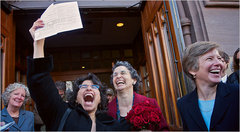Gay Marriages Begin in Connecticut
12 Nov 2008
Taken from The New York Times
By LISA W. FODERARO
NEW HAVEN -- During an exuberant shopping expedition three years ago, Peg Oliveira made a spontaneous proposal in an aisle of Ikea, blurting, "Marry me!" to her partner, Jennifer Vickery.
Last fall, long before the Connecticut Supreme Court legalized same-sex marriage, the couple became formally engaged, with Ms. Oliveira explaining that she "wanted there to be a moment when we each consciously chose to be together for the rest of our lives."
On Wednesday morning, with their 3-month-old daughter, Willow, in tow, Ms. Oliveira and Ms. Vickery became one of Connecticut's first same-sex couples to wed, in a chilly breeze outside City Hall here. Surrounded by journalists and a few friends, they exchanged rings and shared the Ikea story during their vows, along with a slow, tender kiss.
The state's highest court ruled on Oct. 10 that excluding same-sex couples from marriage was unconstitutional, and a week ago the court announced that gay marriages could officially be performed starting on Wednesday.
Many same-sex couples said they would wait to apply for their licenses, which expire after 65 days, to have time to prepare for wedding celebrations in the spring and summer. Indeed, advocates for same-sex marriage predicted that there would not be the same rush for licenses on Wednesday that there was in 2004, when Massachusetts became the first state to legalize gay marriages, or in June, when California began performing them. They cited both the short notice and the fact that Connecticut has, since 2005, offered civil unions, which offer similar rights and benefits, for gay couples.
Still, lawyers and supporters of gay marriage called the day momentous, especially as a counterpoint to the passage last week of a ballot measure in California that invalidated a court decision legalizing gay marriage. Connecticut voters overwhelmingly rejected a proposal, backed by opponents of same-sex marriage, for a constitutional convention that would allow for such direct voter initiatives on the ballot.
"Today Connecticut sends a message of hope and promise to lesbian and gay people throughout the country who want to be treated as equal citizens by their government," said Ben Klein, a senior lawyer with Gay and Lesbian Advocates and Defenders, a Boston-based group that litigated the Connecticut case. "It's living proof that marriage equality is moving forward in this country."
City Hall here was adorned with bunches of white balloons and giant sprays of long-stemmed red roses as Robin and Barbara Levine-Ritterman, who were among the eight named plaintiffs in the lawsuit against the state, obtained a marriage license, although they did not plan to marry immediately. "We're thinking about doing it in May," said Robin Levine-Ritterman, 49, a naturopathic physician and acupuncturist. "But we really wanted to be part of this historic first."
But Ms. Oliveira, 36, a yoga teacher and early childhood education consultant, and Ms. Vickery, 44, a lawyer, did not wait. Officiating at the simple ceremony, just before 11 a.m., was their friend, Judge F. Herbert Gruendel of the State Appellate Court, who recalled Ms. Oliveira's saying five years ago on his porch that she would like to be married. "Today I can say to you that you are," he said.
Before the ceremony, Ms. Oliveira explained why the couple, who have been together for four years, had not entered into a civil union. "We decided that we wanted to hold out for the real thing," she said. "Parties are fun, but it's not about the celebrating piece of this. It's about honoring the magnitude of the rights that we will be granted, and we wanted to jump in and take advantage of that right away."
Massachusetts and Connecticut are now the only states allowing same-sex marriage. New Jersey, Vermont and New Hampshire have civil unions, and California has domestic partnerships, which are similar.
Across the state on Wednesday morning, couples waited for word that Judge Jonathan E. Silbert of Superior Court here had entered a final judgment in the case, thus putting the new marriage law into effect. It was a ceremonial act, since the Supreme Court had ruled, 4 to 3, that the state's civil unions violated the constitutional guarantees of equal protection under the law.
State Representative Beth Bye and her partner of seven years, Tracey Wilson, paced the West Hartford Town Clerk's office on Wednesday morning. As Ms. Wilson handed over the $30 check for the marriage license, she asked, jokingly, if the couple would get a refund on their civil union license from December 2005. The couple's 16-year-old son, Adam Brown, who filmed the seven-minute ceremony, quipped that the only thing making civil unions equal to marriage was the price.
Ms. Bye, who married Ms. Wilson at 9:41 a.m., said she was not necessarily vying to be No. 1 in the state, but did want to be the first to get married in West Hartford -- her hometown and part of her district.
"I always knew you were the most competitive person in the world," said Scott Slifka, the mayor of West Hartford, by way of congratulations.
By 4 p.m., six couples had obtained licenses at West Hartford Town Hall, including Elizabeth Kerrigan and Joanne Mock, the two lead plaintiffs in the lawsuit, who planned to marry in the coming months.
Michael Miller and Ross Zachs handed out white frosted cupcakes with the letters M and R on them after marrying on the steps of Town Hall. As Carole MacKenzie, a Universalist Life minister, concluded the ceremony, saying, "By the authority invested in me by the State of Connecticut," the crowd erupted in applause.
Christine Stuart contributed reporting from West Hartford, Conn.



 Marriage Equality is a proud member of NELFA
Marriage Equality is a proud member of NELFA